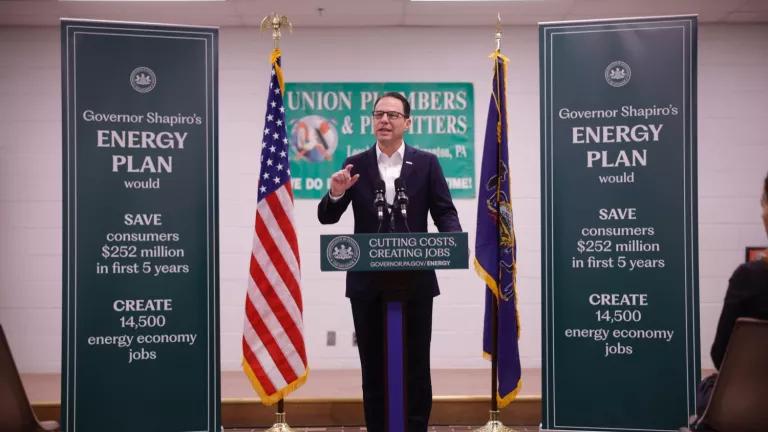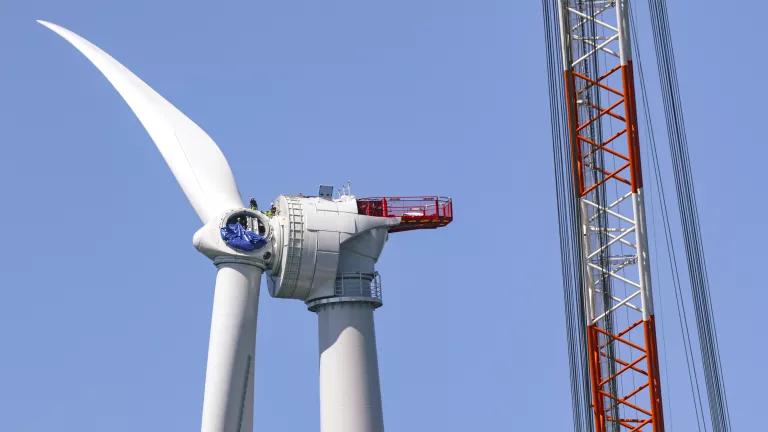There’s no environmental imperative more urgent, and no higher priority at NRDC, than to protect ourselves and our children from the growing dangers of climate change.
That means, first and foremost, cutting the carbon pollution that’s driving this global scourge, by moving toward cleaner, smarter ways to power our future, shifting away from fossil fuels, and doing so as quickly as possible.
Those goals go hand in hand.
NRDC has fought for decades for energy efficiency and clean energy sources. As we invest in more efficient homes and workplaces, for example, we’re holding down energy consumption, and the carbon footprint that comes with it, while improving living standards and growing our economy. Producing high-mileage hybrid and all-electric cars and trucks cuts our dependence on oil. And, by getting more clean, homegrown American power from the wind and sun, we can wean ourselves off coal and natural gas while protecting our climate.
We’re also fighting to protect our public lands from the dangers of coal mining and oil and gas drilling in special places like the Arctic National Wildlife Refuge, Bears Ears and other national monuments. We’re battling to block development of dirty crudes like tar sands. And we’re defending our oceans, marine life and coastal communities from disastrous spills, toxic pollution, and industrial ruin.
Public policy should help advance the kind of clean energy economy that already provides good jobs for more than three million Americans. The clean energy revolution, in fact, is the economic play of our lifetime, projected to attract some $7 trillion in global investment over just the next two decades or so. American companies and workers must be at the center of this epic transition. Our national policies should promote clean and efficient energy, and not subsidize dirty fuels that wreak havoc on our world and threaten our children’s future.
While we pursue the fastest possible transition to clean energy and away from dirty fuels, the scale and urgency of climate change demand that we also do everything possible to cut the dangerous carbon pollution from any fossil fuels that are used. Not doing so increases the risk of warming the planet to unacceptable levels.
That’s why, along with promoting clean energy and efficiency and shifting away from fossil fuels, NRDC has long supported policies to advance a proven technology called “carbon capture and storage” (CCS). It’s a way to capture carbon dioxide pollution that would otherwise be emitted by the fossil-fueled power plants and industries we still have, and permanently bury that pollution underground. These power plants and industrial facilities should not be allowed to dump their carbon pollution in the air for decades more.
This technology is already being used at more than a dozen large sites in the United States and Canada. For nearly a decade, NRDC has pressed for public policies to help increase its use. That hinges on reducing costs through the learning that comes from building and operating more pioneer plants. This strategy is precisely what brought the costs of wind and solar power down roughly 70 percent over the past decade.
The congressional budget deal President Trump signed into law in February includes tax credits for carbon capture and storage. Credits ramp up over time to $50 for every ton of carbon dioxide that is captured and permanently stored in geological structures underground. Private and government analysts alike have said this credit could help spur dozens of CCS projects nationwide. These projects will cut carbon pollution and create construction and operations jobs for pipe fitters, welders, electricians, skilled technicians, and more.
Additionally, the new law also provides a tax credit of up to $35 a ton for capturing carbon dioxide, using it for “CO2-enhanced oil recovery” (EOR), and permanently storing it underground. EOR is a way to coax out crude oil that remains in aging fields after they have been produced, by injecting carbon dioxide into the wells.
We don’t support subsidies for fossil fuel production, including subsidies for enhanced oil recovery, that would conflict with the need to reduce our dependence on those fuels. We will work to ensure that the new tax credits are used as much as possible for CCS projects that bury carbon dioxide in deep geologic formations without producing oil, or put it into materials like cement that lock it up for good.
Many people do not know, however, that most of the carbon dioxide used today for enhanced oil recovery is mined from underground. Pulling up carbon dioxide that’s already locked away underground doesn’t make sense.
So, to the extent that enhanced oil recovery continues, we want it done with captured CO2 that would otherwise have gone into the air, rather than by mining more CO2 from underground. Under the new law, EOR operators will get a tax break only if they use carbon dioxide captured from power plants and industry, rather than carbon dioxide mined from underground, and only if they trap it securely underground.
Over many generations, the fossil fuel industry has received hundreds of billions of dollars in subsidies from American taxpayers. It’s long past time for that to end. No taxpayer anywhere in America should be forced to spend one more dime to subsidize the production of coal, gas or oil.
Burning fossil fuels, after all, has raised carbon dioxide levels in the atmosphere more than 40 percent since the dawn of the industrial revolution. That’s why we just finished the four hottest years since global record-keeping began in 1880. It’s why an iceberg the size of Delaware sheared off Antarctica last year. And it’s increasingly why entire species are disappearing faster than at any other time in more than 60 million years, the Great Barrier Reef is dying and we, in the United States, experienced extreme weather and climate-related disasters that cost a record $306 billion in damages last year alone.
All of this will get worse unless we move to clean energy solutions and phase out our use of fossil fuels, in a way that provides a just and equitable transition and creates millions of jobs.




